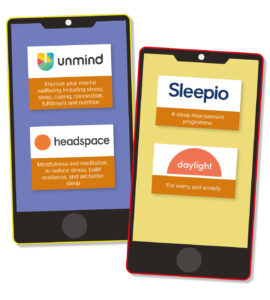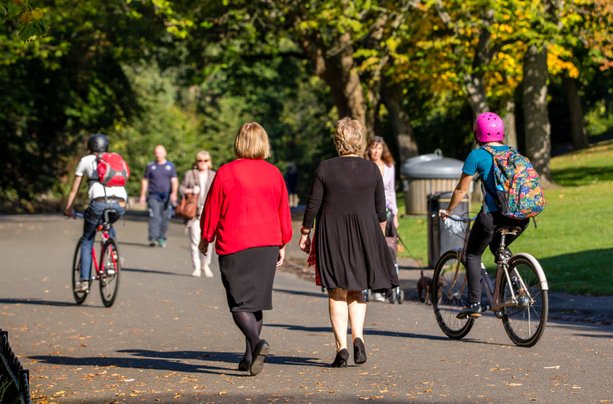Mental health is about the way we think, feel and behave and our ability to cope. It is influenced by a range of factors, including our work and home life and by the experiences we have had. NHS Highland understands that they have a crucial role to play in supporting the health and wellbeing of our employees, whether the problems are related to work or not.
We’ve pulled together a range of information, links and tools which you can access.
Chaplaincy service
The Department of Spiritual Care offers support to staff by creating opportunities to talk about the issues that matter most and the impact that work has on us all. At a time like this people may have lots of questions about conflicted values and the meaning of life and the department of spiritual care is uniquely placed to help address some of these difficult topics.
- North Highland – You can contact by calling 01463 704 463 during office hours. Out of hours call 01463 704 000 and ask for the duty chaplain.
- Oban, Lorn & Mull – call 07989 350 626 or by email – robert.macleod2@nhs.scot
- Campbeltown / Kintyre – call 07970 753 882 or by email – andrea.holden@nhs.scot
- Bute, Cowal, Helensburgh, Lochgilphead, Islay call 07580 533 400 or by email – raymond.deans@nhs.scot
Helplines, websites and other resources
Helplines
Breathing Space – 0800 83 85 87
NHS 24 – 111
Samaritans – 116 123
Drinkline – 0300 123 1110
Know the Score (drugs helpline) – 0333 230 9468
Offline Reading
‘Active meetings, active breaks: from good intentions to good habits‘ – a PDF guide
Websites
- NHS Inform – key information and guidance
Mental Health Support
Substance Use Support
Managing Stress
The following links provide information on how to manage your stress in the workplace.
Mental health
We all have mental health, just the same as we all have physical health. Our mental health is about our thoughts, feelings and actions. It can affect our relationships and how we deal with life’s challenges. It can be affected by bereavement, unemployment, poor living conditions, financial difficulties and things that make us feel unsafe and not in control. Our mental health can vary across time, just as our physical health can. There are lots of things we can do to protect our mental health and wellbeing. Often these are described as “five ways to wellbeing”; they are staying connected with others; being physically active; learning a new skill; giving to others and paying attention to the present (sometimes called mindfulness). You can read more about the “five ways” via the Mind website.
It’s good to be aware of how we are feeling, and when things don’t seem right, to seek help – both for mental and physical health. Our GP is a good first point of contact. If you feel you need someone to talk to about anything, you can always call Samaritans on 116 123 or Breathing Space on 0800 83 85 87. Childline supports people up to their 19th birthday on 0800 1111.
To support others we need to be compassionate, and not judgmental. If we think someone is struggling with their mental health, or is feeling suicidal, we should ask them. Open questions are good, such as “How long has this been going on?” or “That must have been awful for you. You sound like you have lost hope, are you feeling suicidal?” There is more information about this in the animations below, and in the booklet “The art of conversation“. We also need to look after ourselves when we are supporting others – “you can’t pour from an empty vessel”. Think about what your wellbeing plan includes – who can you talk to, what activities help you unwind?
Stigma
People who experience poor mental health still feel stigma – from others and from themselves. This can stop people seeking help, and add to their feelings of being a burden, or not being accepted, ultimately adding to feeling bad. We may be treated differently by others if we experience poor mental health. See Me Scotland exists to challenge stigma.
Workplace wellbeing
See Me’s website includes lots of useful information, including a workplace section. See Me report “stigma and discrimination is a key issue for many employers and employees, for those trying to get a job and for people returning to work following a period of ill health”. Their website contains a lot of useful information to help us all contribute to a mentally healthy workplace. Mental Health at Work – Mind is another useful website for helping us all make our workplace a mentally healthy one. The UK Health and Safety Executive (HSE) website has a section on Work related stress.
Mental health information and support
If you are looking for more information about mental health for yourself, or friends or family, check out Highland Mental Wellbeing Toolkit. This contains details of lots of different resources including information, and help and support.
Mental health and physical activity
Physical activity, especially outside, is proven to boost mood and improve mental wellbeing. Having an active commute, taking a quick walk at lunchtime or simply sitting in the fresh air for five minutes can all help. For support on active commuting or work trips check the staff intranet under Staff > Active Travel, and on Facebook – NHS Highland Active Travel.
Further information on physical activity can also be found on the Healthy Body section of this site.
Physical activity
Physical activity, especially outside, is proven to boost mood and improve mental wellbeing. Having an active commute, taking a quick walk at lunchtime or simply sitting in the fresh air for five minutes can all help. For support on active commuting or work trips check the intranet under Staff > Active Travel. Please also see the NHS Highland Active Travel Facebook page for further information.
Suicidal thoughts and deaths by suicide
It’s important to be aware that it is not only people with poor mental health who feel suicidal, so be aware other circumstances (e.g. broken relationships, financial problems) may contribute to a person’s “mental distress” and consequent suicidal thoughts. Scotland’s rates of deaths by suicide showed an increase in the most recent data available, with more than two people per day dying by suicide. There are things we can all do to help support people who feel suicidal. Evidence shows people don’t want to die, but want their pain to end. As part of suicide prevention NHS Education Scotland, NHS Health Scotland and Scottish Government created three short five minute animations. All of these encourage us to ask if we feel someone is struggling with their mental health. They are available on Vimeo:
- Ask, Tell, Look After Your Mental Health (what our mental health is and what affects it).
- Ask, Tell, Save a Life: Every Life Matters (facts about suicide; risk factors, asking)
- Ask, Tell, Have a Healthy Conversation (active listening)
Highland Community Planning Partnership have developed a suicide prevention app which supports everyone – those who experience suicidal thoughts, and those who support them. It includes a safety plan for individuals to complete, and is available here:
- Suicide Prevention – Highland (Apple App Store link)
- Suicide Prevention – Highland (Google Play Store link)
Mental Wellbeing Apps and Websites
Through a partnership scheme between Big Health and NHS Scotland, Sleepio and Daylight continue to be available at no cost for all staff in the NHS and the Social Care sector (including unpaid carers) throughout the outbreak response. Big Health’s digital therapeutics offer users evidence-based cognitive behavioural techniques via mobile and web, without the need for human contact. More information is available on their website.
Wellbeing apps like Headspace and Unmind provide further options to relax and unwind.

NHS Employees can access Headspace for free
What is Headspace?
Headspace is a subscription-based app and online resource for helping anyone relax, focus and sleep better with mindfulness and breathing exercises of varying themes, formats, and durations to suit personal preferences.
Who can sign up for Headspace for NHS?
If you are an NHS employee with a registered NHS email address, you can sign up to access Headspace at no cost.
Please note: You will not be asked for payment to activate this subscription. Please sign up using the steps below on a mobile or desktop browser before downloading the Headspace app.
Here’s how to sign up for Headspace for NHS:
- Go to the Headspace NHS page and follow the sign-up prompts
- Select your type of profession for the NHS:
- Clinical professionals (e.g. Doctors, Nurses, etc.)
- Non-clinical professionals (e.g. administrative functions)
- Wellbeing lead (e.g. the person responsible for staff wellbeing)
- After you have selected your NHS profession type, you’ll be directed to a new page to sign-up and enrol in the benefit.
- Create a new Headspace account or log into your existing one
- Verify that you work for the NHS by providing your NHS email address
- Go to your NHS email and click on the verification email you just received
- Download the mobile app and log into your Headspace account
SilverCloud is another wellbeing website which provides access to sleep, stress and building resilience programmes.
Self care
- Take care of your basic needs at work. Eat and drink regularly and healthily. Always take regular breaks during shifts
- Make sure you are getting your news from trusted sources and limit your exposure to social media if you find it is heightening your anxiety
- Maintain, where possible, your normal daily routine and a healthy diet, and get fresh air when you can. Avoid using unhelpful coping strategies that involve alcohol, tobacco or an unhealthy diet.
- Stay connected to family and friends by phone, email or video calls
- Think about creating a consistent routine to ensure you get the amount of sleep you need, but also about ensuring your bedroom is quiet, dark and a relaxing environment to sleep in.
- It is perfectly normal to feel worried during exceptional times such as these. However, if you are starting to feel overwhelmed, it’s important to acknowledge your feelings and speak to someone you trust, whether that’s a friend, a family member, or a colleague. There’s lots of different contacts, websites, apps and helplines later in this message.
- Finally, some lifestyle tips from Michael Mosely via his BBC Radio 4 show ‘Just One Thing’ that are scientifically proven to support your wellbeing.
- Take 5 is an invitation for NHS Highland and Argyll & Bute Health and Social Care Partnership colleagues to take 5 minutes out of the busy working day to pause, to listen, perhaps to a reflection or some poetry, or maybe to do a guided practice in mindfulness or another wellbeing activity. Please visit the NHS Highland Take 5 YouTube channel for more information.
Looking after each other
- Be kind to each other. This can have a profound impact on staff wellbeing.
- Civility Saves Lives is a website founded by healthcare professionals who are raising the awareness of the power of civility and kindness in medicine.
- Speak to colleagues, line managers and professional leaders, building this into your team’s daily huddles and handovers. They may be feeling the same way. It’s good to talk. Peer and social support are often the best buffers against stress and adversity.
- Look out for each other and share small successes about what’s gone well.
- Not all of you will be ‘talkers’. That’s OK too but make sure you give yourself space to process the events of the day and deal with your feelings.
Spaces for Listening
Spaces for Listening is a simple and lightly-structured process which creates a space for colleagues to come together and share their thoughts and feelings over a Teams chat. It is confidential, there is no hierarchy and everyone participates as people.
An 11 minute video presentation has been created, providing an overview of Spaces for Listening and what to expect during a session (NB: please note the video is held on NHS Scotland networks and may not work on a home computer)
What to expect?
There are three rounds of timed contributions – 2 minutes per person, in each round.
Each space for listening comprises a group of eight people, meeting together over Teams, for about one hour in total.
There is a prompt for each round:
- Round 1: How are you, and what’s on your mind?
- Round 2: Any reflections or feelings in the light of Round 1?
- Round 3: Anything to take away, and anything that has resonated, which you have appreciated?
Everyone can use their time to say whatever they like; the host will indicate when the time is up.
Everyone takes a turn in a pre-set order. The host is also an equal participant.
Participation is voluntary and anyone can ‘pass’ when it is their turn.
When the eighth person has spoken in Round 3, the session ends.
Dates and times
- 30 August 16:00 – 17:00 contact annsmith1@aberdeencity.gov.uk
- 5 September 15:00 – 16:00 contact fiona.sharples@nhs.scot
- 14 September 09:30 – 10:30 contact linda.mcauslan@nhs.scot
- 23 September 10:00 – 11:00 contact fiona.sharples@nhs.scot
- 29 September 16:00 – 17:00 book via eventbrite
An example of a Spaces for Listening meeting can be found on the National Wellbeing Hub website.
Supporting your psychological wellbeing
We have established a Staff Psychological Wellbeing Network across the organisation, to provide advice and support to build and maintain the psychological wellbeing of our colleagues, to increase resilience and to reduce the likelihood of burnout, trauma, or other emotional injury, across our board area during the Covid-19 outbreak. These psychological support services are available to all staff, clinical and non clinical, should they need it. They include:
- Psycho-education and self-help information sheets, posters for walls and weblinks for devices which can be accessed in the quiet rooms that have been created.
- Audio and video clips are available to download on personal devices to use as needed, including short exercises; including mindfulness, stress reduction, sleep hygiene, relaxation and grounding.
- A member of the psychological team can be made available at handover of shifts for
staff debrief & support, on request.
In addition, colleagues can access the Psychological Services Staff Support Team directly by email: nhsh.covid19staffsupport@nhs.scot.
This service is staffed from 9am to 5pm, but messages can be left out with these hours. Emails will be replied to the next working day.

